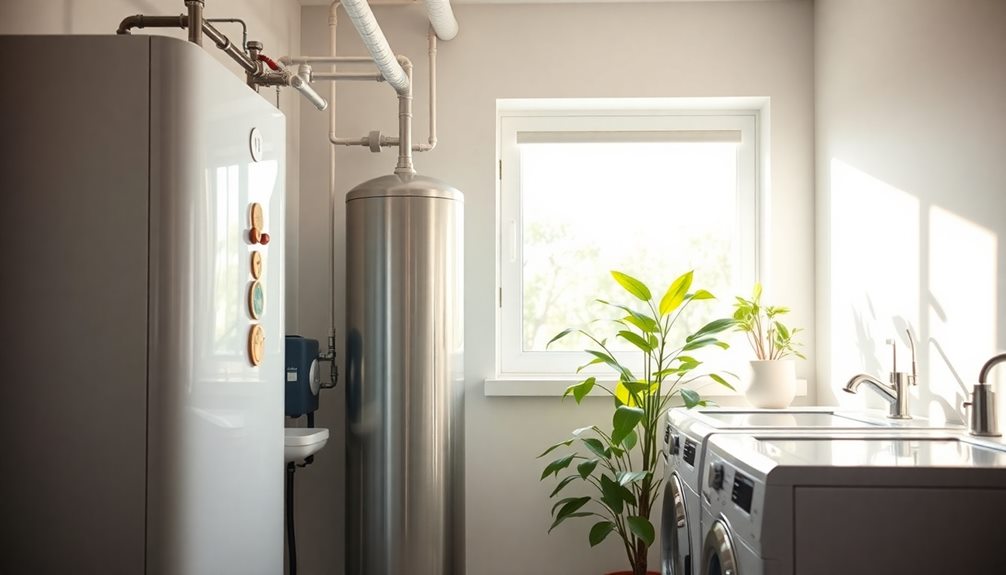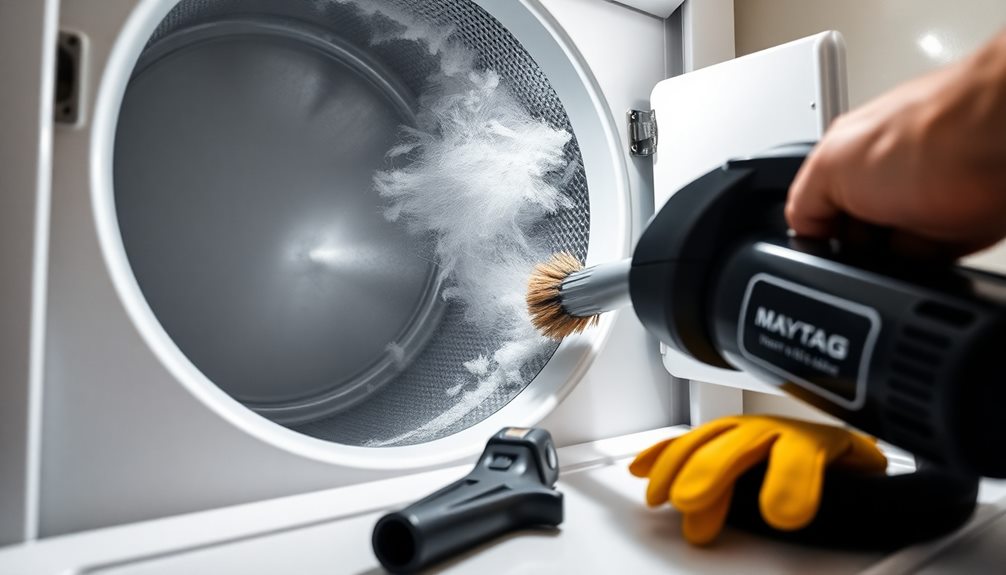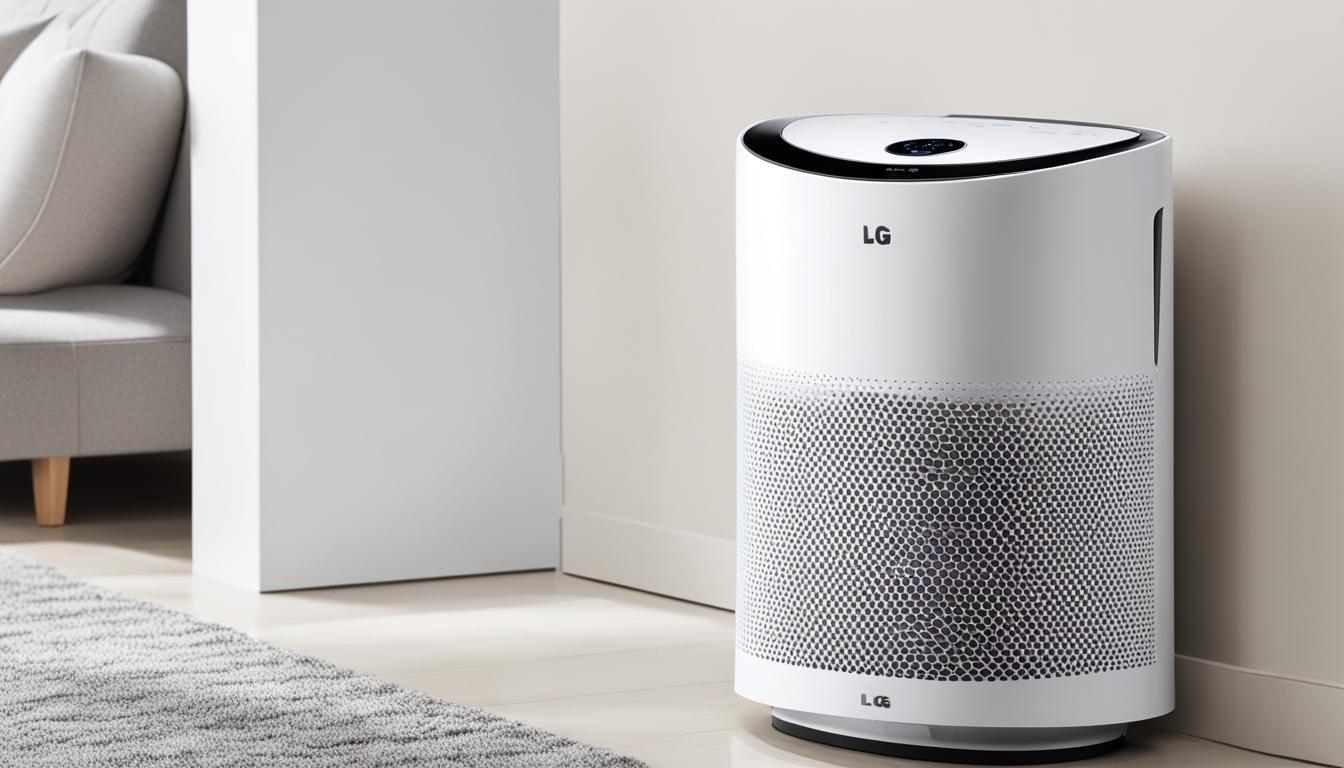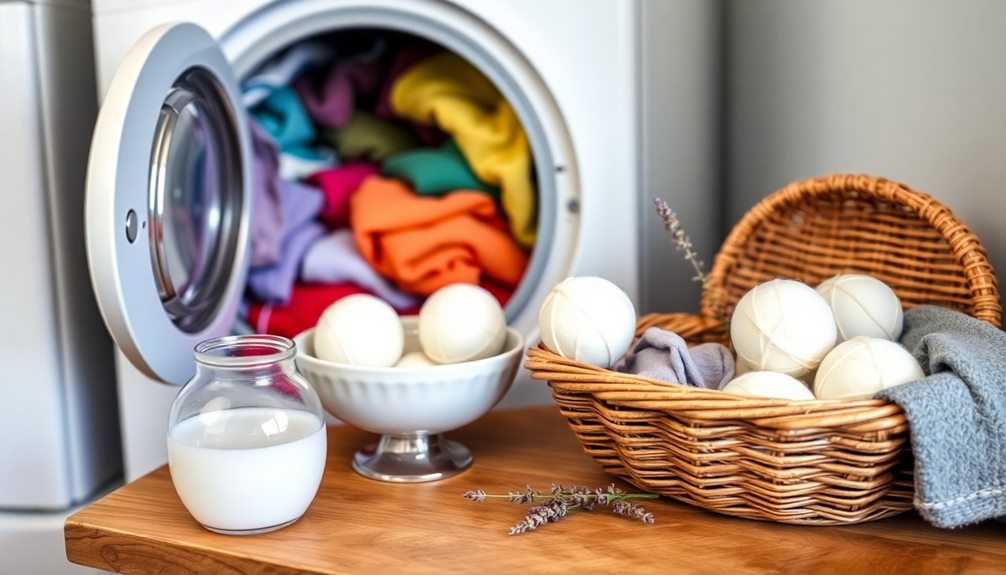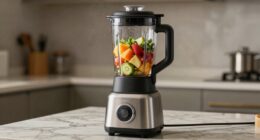Yes, a water softener is indeed considered an appliance. It plays an essential role in enhancing your water quality by reducing hardness through an ion exchange process. This process replaces hard minerals like calcium and magnesium with sodium or potassium, improving the effectiveness of soaps and detergents. With a water softener, you can enjoy cleaner dishes, softer laundry, and even more comfortable skin. Regular maintenance guarantees peak performance and longevity. If you're curious about the different types of systems available and their benefits, you might find the following information particularly enlightening.
Key Takeaways
- A water softener is considered an appliance as it is a mechanical device that processes water for household use.
- It employs an ion exchange process, making it essential for improving water quality and reducing mineral buildup in plumbing.
- Water softeners are installed in homes and function continuously, similar to other household appliances like dishwashers or washing machines.
- They require regular maintenance and monitoring, reinforcing their classification as household appliances that enhance daily living.
- Consumer experiences highlight their role in improving cleaning efficiency and overall water quality, further supporting their status as appliances.
Understanding Water Softeners
Understanding water softeners is vital for anyone looking to improve their home's water quality. These appliances work by reducing water hardness through the ion exchange process, swapping out undesirable calcium and magnesium ions for sodium or potassium ions.
This exchange not only enhances water quality but also improves the effectiveness of soaps and detergents, leading to better cleaning performance.
Typically, a water softener system includes a brine tank for salt storage, a resin tank for carrying out the ion exchange, and a control valve that manages water flow and triggers the regeneration cycle.
The presence of a brine tank is important, as it guarantees there's always enough salt available for the softening process.
Functionality of Water Softeners
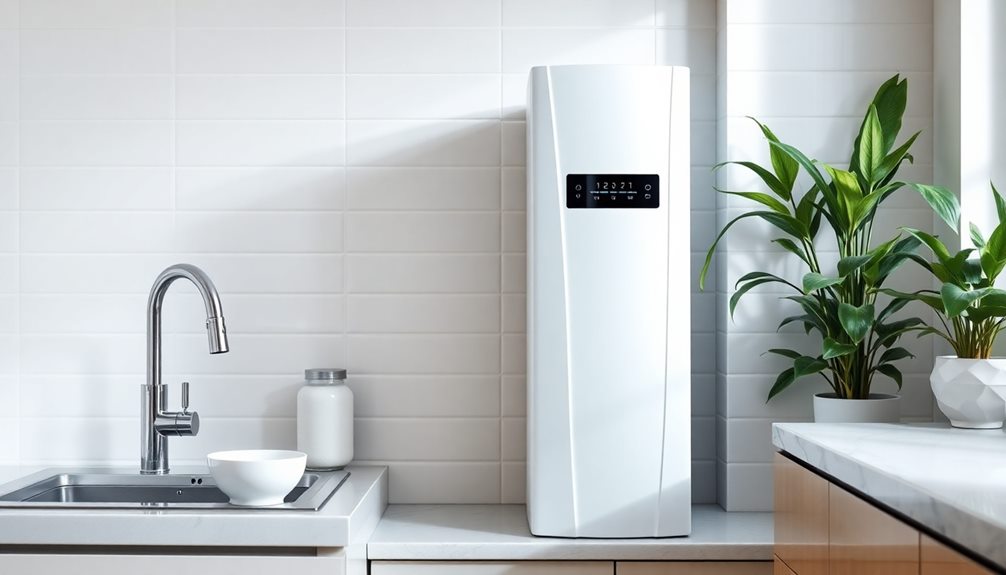
When it comes to enhancing your home's water quality, water softeners play an essential role by effectively tackling hard minerals. These systems work through an ion exchange process, where hard minerals like calcium and magnesium are swapped out for sodium or potassium ions. This process greatly reduces water hardness, making your water more suitable for daily use.
Water softeners use several key components to function efficiently. Here's a quick overview:
| Component | Function |
|---|---|
| Brine Tank | Stores salt for the regeneration process |
| Resin Tank | Contains resin beads where ion exchange occurs |
| Control Valve | Regulates water flow through the system |
| Regeneration Cycle | Flushes resin beads to remove accumulated minerals |
The regeneration process is vital for maintaining efficiency in your water softener. During this cycle, the resin beads are flushed with a brine solution, allowing them to continue exchanging ions effectively. By improving cleaning efficiency and prolonging the lifespan of appliances, water softeners greatly enhance your overall water quality, ensuring that your household's water is both soft and functional.
Types of Water Softeners

When it comes to water softeners, you've got a couple of main options: salt-based systems and salt-free alternatives.
Salt-based systems use an ion exchange process to tackle hard minerals, while salt-free options employ different technologies to prevent buildup without removing those minerals.
Knowing the differences between these types can help you choose the right solution for your needs.
Salt-Based Systems
Salt-based water softeners are the most widely used systems for tackling hard water issues in homes. These units employ an ion exchange process where sodium ions replace hard minerals, like calcium and magnesium, effectively softening your water.
Typically, a salt-based water softener consists of two main components: a brine tank for storing salt and a resin tank where the softening process takes place.
During the regeneration cycle, which usually occurs during low water usage times, a brine solution cleans the resin beads and replenishes sodium ions. This guarantees your system continues to function efficiently, providing consistent water treatment.
One of the significant benefits of using salt-based systems is the improved lathering ability of soaps and detergents, leading to better cleaning performance and reduced usage of cleaning products.
However, it's crucial to be mindful of the increased sodium levels in the softened water, especially for individuals on sodium-restricted diets.
Salt-Free Alternatives
Exploring alternatives to traditional salt-based water softeners reveals a range of salt-free options designed to address hard water issues without adding sodium.
Salt-free systems employ innovative technologies like template-assisted crystallization to prevent mineral buildup in your pipes and appliances that use water. Unlike their salt-based counterparts, these systems don't remove hardness minerals; instead, they alter their behavior, which can help reduce scaling.
While salt-free water softeners may not fully soften water, they do improve the performance of soaps and detergents, making your cleaning tasks more effective. They're particularly suitable for those monitoring sodium intake, as they won't add sodium to your water supply.
Another advantage of salt-free systems is their low maintenance requirements. You won't have to deal with the wastewater produced by traditional softening methods, addressing some environmental concerns.
However, keep in mind that some salt-free options, like electronic or magnetic devices, have less scientific backing regarding their effectiveness. If you're considering a salt-free alternative, evaluate your specific needs and weigh the benefits of softened water against the limitations of these systems.
Importance of Softened Water
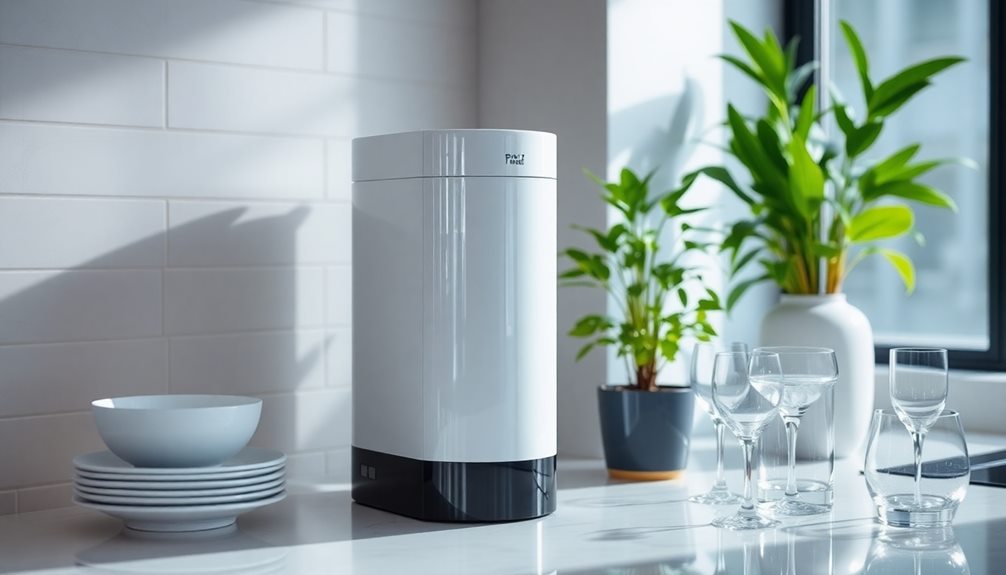
Softened water plays an essential role in enhancing your daily life, offering numerous benefits that go beyond just improved taste. By reducing hard water minerals like calcium and magnesium, softened water greatly improves your water quality, making daily tasks easier and more efficient.
| Benefits of Soft Water | Impact |
|---|---|
| Improved Soap Effectiveness | Reduces soap usage by 50% or more |
| Extended Appliances Lifespan | Prevents mineral scale buildup |
| Enhanced Skin and Hair Health | Alleviates dryness and irritation |
| Spotless Dishes and Glassware | Minimizes streaks and deposits |
With softened water, you'll notice that soaps and detergents lather better, allowing you to use less product. It also keeps your plumbing and appliances in top shape, extending their lifespan and lowering maintenance costs. Additionally, softened water is gentler on your skin and hair, helping to combat the dryness and irritation often caused by hard water minerals. Finally, using softened water guarantees your dishes and glassware shine without spots or streaks, elevating your overall hygiene and cleanliness at home.
Effects of Hard Water
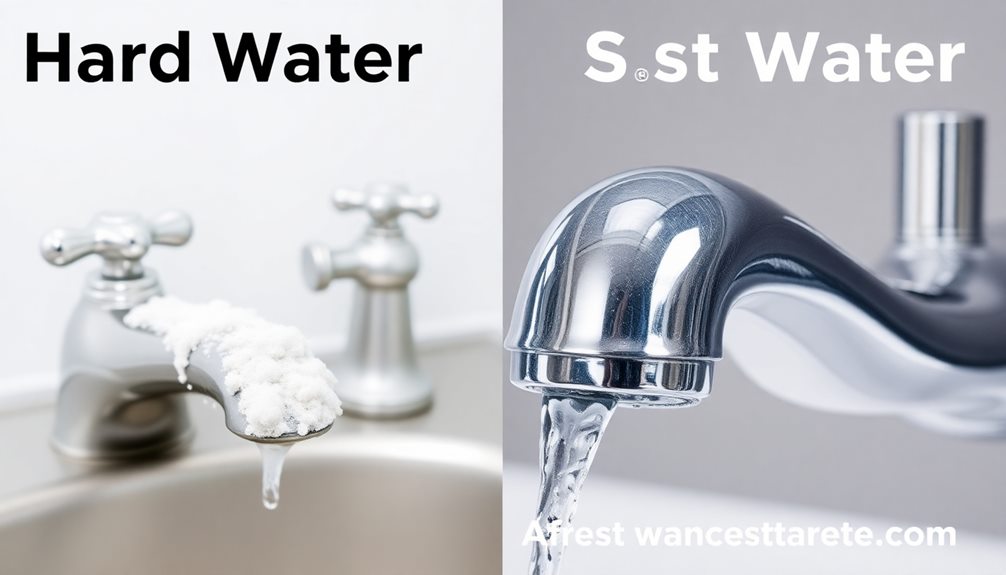
Many homeowners unknowingly grapple with the effects of hard water, which can wreak havoc on daily routines and household items. If you're dealing with hard water, you may notice soap scum buildup in your shower and on your dishes, leading to cloudy glassware and reduced cleaning efficiency.
With around 90% of homes in the U.S. experiencing this issue, it's essential to understand the long run consequences.
The hardness of your home's water results from high levels of minerals such as calcium and magnesium. This mineral buildup doesn't just affect your cleaning; it can also damage plumbing and appliances over time, considerably reducing their lifespan.
You might find that your laundry feels stiff, and it could be a challenge to achieve a good lather while showering.
Additionally, long-term exposure to hard water can lead to skin irritations and dryness, causing chronic skin and hair problems.
If you want to combat these effects, investing in a water softener can be a game-changer, helping you maintain a healthier home environment and prolonging the life of your plumbing and appliances.
Ion Exchange Process Explained
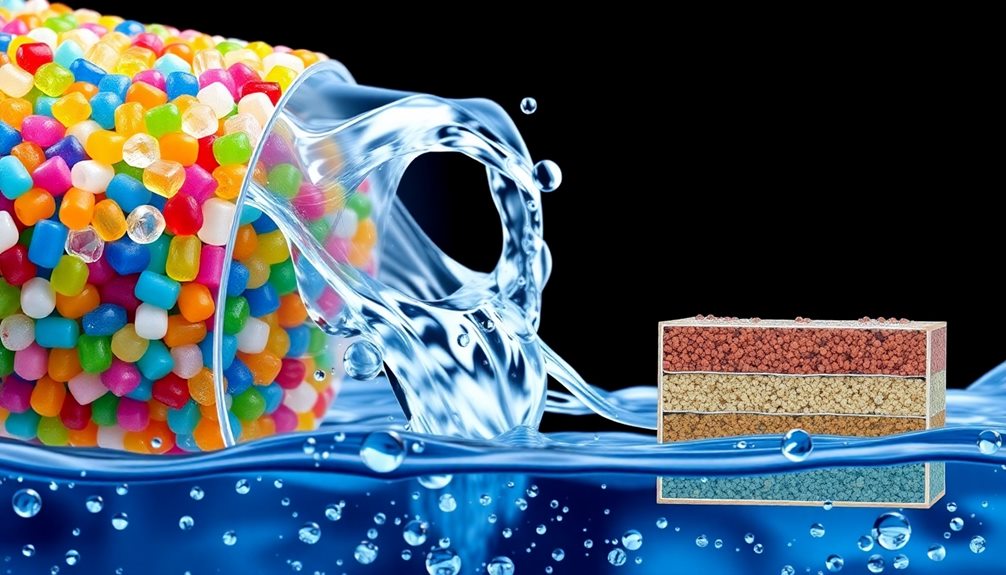
The ion exchange process is the heart of how water softeners work to combat hard water issues. When hard water flows through the resin tank of your softener, it encounters resin beads designed to capture the minerals that cause hardness, specifically calcium and magnesium.
These positively charged hard minerals displace the sodium ions already present, effectively softening the water.
This process not only improves the quality of your water but also considerably reduces mineral buildup in your pipes and appliances, extending their lifespan and enhancing their performance.
However, to maintain ideal performance, your water softener requires regular regeneration. This typically happens during low water usage times when a brine solution replenishes the sodium ions and flushes out the accumulated hard minerals.
Regional Considerations for Softening

Water hardness isn't uniform; it varies greatly by region, influencing the effectiveness and choice of water softening systems. In areas with high water hardness, you might face issues like appliance wear and plant damage, making water softeners a necessity.
Local water quality assessments can help you understand the specific hard water problems in your area, guiding your choice of system.
If you're using a private well, the mineral composition could differ considerably from municipal sources, affecting your water softening needs.
Some regions might even encourage salt-free softening options due to environmental concerns around sodium chloride discharges into freshwater ecosystems. This is particularly important if you live in areas where regional water regulations restrict certain chemical uses.
Before purchasing a water softener, be sure to consult local guidelines. They can provide insights into what's permissible and what's recommended, ensuring you make an informed decision.
Consumer Experiences With Softeners
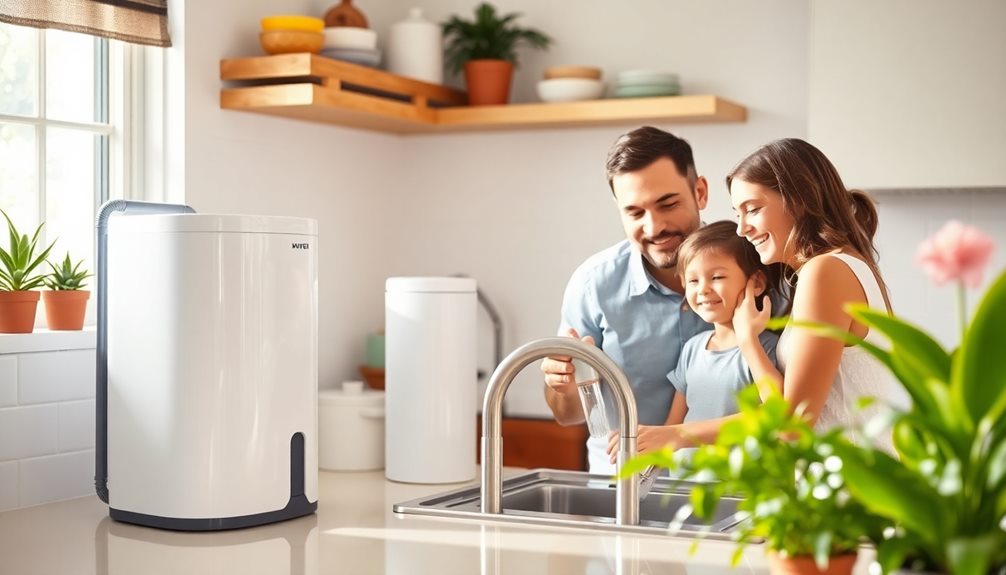
Investing in a water softener can transform your household experience, leading to cleaner dishes and softer laundry. Many consumer experiences highlight significant improvements in water quality, making daily tasks much easier.
Additionally, incorporating eco-friendly practices, like those used with wood stoves, can further enhance your home environment. Here are some common themes you might find when researching softeners:
- Skin Health: Users often report reduced skin irritation and dryness, leading to improved hair health and overall comfort.
- Research Local Hardness: Before purchasing, check your local water hardness levels. This guarantees the softener will meet your specific needs.
- Installation Matters: Many homeowners stress the importance of professional installation for peak performance, as following the manufacturer's instructions can make a big difference.
- Regular Maintenance: To guarantee longevity and efficiency, don't forget to schedule regular maintenance for your water softening system.
While some consumers prefer salt-free systems for environmental reasons, skepticism about their effectiveness compared to traditional salt-based systems remains.
Ultimately, your experience with a water softener will depend on your unique water quality and how well you adhere to maintenance and installation guidelines.
Environmental Impacts of Water Softening
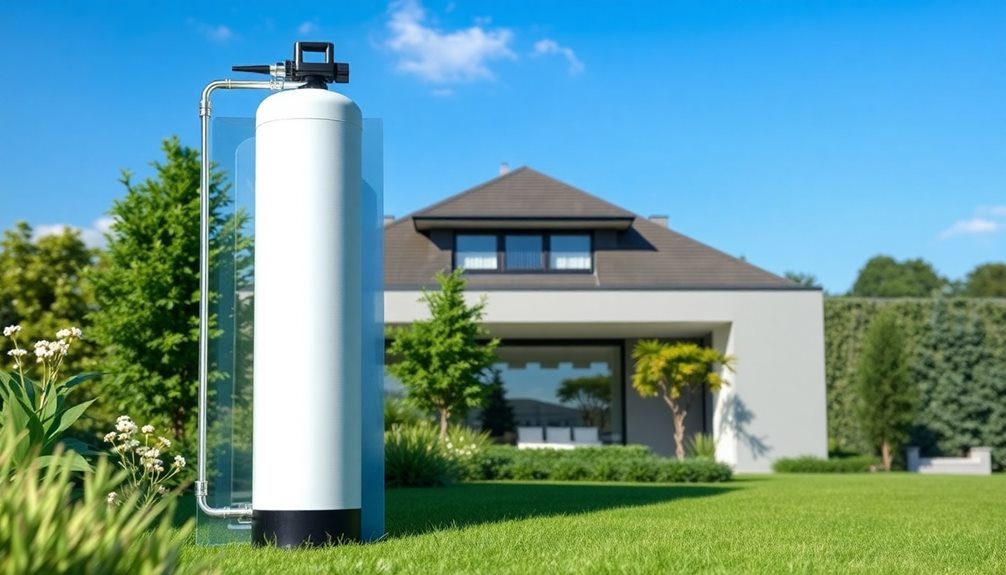
Many homeowners are unaware of the environmental impacts that come with using water softeners. One significant concern is the chloride released into the environment, which can threaten freshwater ecosystems. Just one teaspoon of water softener salt can pollute up to five gallons of water, leading to severe consequences for aquatic life.
The wastewater generated during the regeneration process often contains high levels of chloride that municipal treatment plants struggle to eliminate, resulting in contamination of local water quality.
As chloride accumulates in lakes and streams, it poses long-term risks to biodiversity and disrupts local ecosystems. This issue is pressing enough that some regions have started regulating or limiting water softener usage. The salt can also leach into groundwater, contaminating septic systems and exacerbating environmental concerns.
Fortunately, there are environmentally friendly alternatives available that can soften water without causing harm to the ecosystem. By considering these options, you can help protect freshwater resources while still enjoying the benefits of softened water.
Making informed choices about water softeners is vital for preserving our environment.
Frequently Asked Questions
Is a Water Softener Considered an Appliance?
Yes, a water softener's definitely considered an appliance. It reduces water hardness by removing minerals, integrates into your plumbing, and requires maintenance, much like other appliances that enhance your home's overall water quality.
What Is the Downside of a Water Softener?
A water softener can increase sodium levels in your drinking water, corrode pipes, and require regular maintenance. Additionally, it impacts the environment negatively, threatening freshwater ecosystems and straining local wastewater treatment systems.
Do You Really Need a Water Softener?
Imagine your water's a rough diamond; a water softener polishes it. If your area's hard water is causing soap scum or appliance fatigue, you'll find a softener's benefits can make a sparkling difference in your home.
Is a Water Softener Considered a Fixture?
A water softener can be considered a fixture in your home since it plays an essential role in improving water quality. Its integration into your plumbing system makes it vital for maintaining daily water usage and hygiene.
Conclusion
In the grand scheme of things, a water softener is definitely an appliance worth considering. It not only makes your water more pleasant to use but also protects your home's plumbing and appliances from the damaging effects of hard water. By investing in a water softener, you're not just improving your quality of life; you're also safeguarding your home. So, if you've been on the fence, it's time to take the plunge and enjoy the benefits of softened water.
